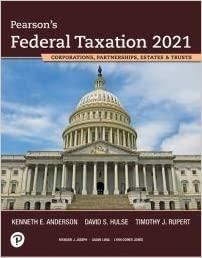Alice, a married taxpayer, will form Morning Corporation in the current year. Alice plans to acquire all
Question:
Alice, a married taxpayer, will form Morning Corporation in the current year. Alice plans to acquire all of Morning’s common stock for a $1 million contribution to the corporation. Morning will obtain additional capital by borrowing $200,000 from a local bank. Morning will conduct a variety of service activities with little need to retain its capital in the business. Alice expects start-up losses of $80,000 during Morning’s first year of operation. She expects the corporation to earn pre-tax operating profits of $220,000 (before reduction for Alice’s salary) starting next year. Alice plans to withdraw $90,000 of Morning’s profits as a reasonable salary. Her other income consists primarily of ordinary income (no dividends or capital gains) from other sources, including her husband’s salary, and she expects these amounts to total $115,000 annually. What advice can you provide Alice about the advisability of making an S election in the initial tax year? In the next tax year? In answering these questions, compare the following alternatives: (1) S corporation in both the current year and the next year, (2) S corporation in the current year and C corporation in the next year (i.e., by revoking the S election next year), (3) C corporation in both the current year and the next year, and (4) C corporation in the current year and S corporation in the next year. When analyzing these alternatives, consider the total income taxes associated with each alternative, specifically, at the corporate and shareholder levels and across both years. Ignore payroll taxes, however.
Also, assume the following facts:
(1) For both years, the standard deduction is $24,800;
(2) 2020 tax rate schedules remain the same for both years;
(3) Alice claims the qualified business income (QBI) deduction where appropriate;
(4) A 5% discount rate applies for present value calculations. Although this problem asks for only a two-year analysis, discuss some shortcomings of such a short time frame.
Step by Step Answer:

Federal Taxation 2021 Corporations, Partnerships, Estates & Trusts
ISBN: 9780135919460
34th Edition
Authors: Timothy J. Rupert, Kenneth E. Anderson, David S. Hulse





